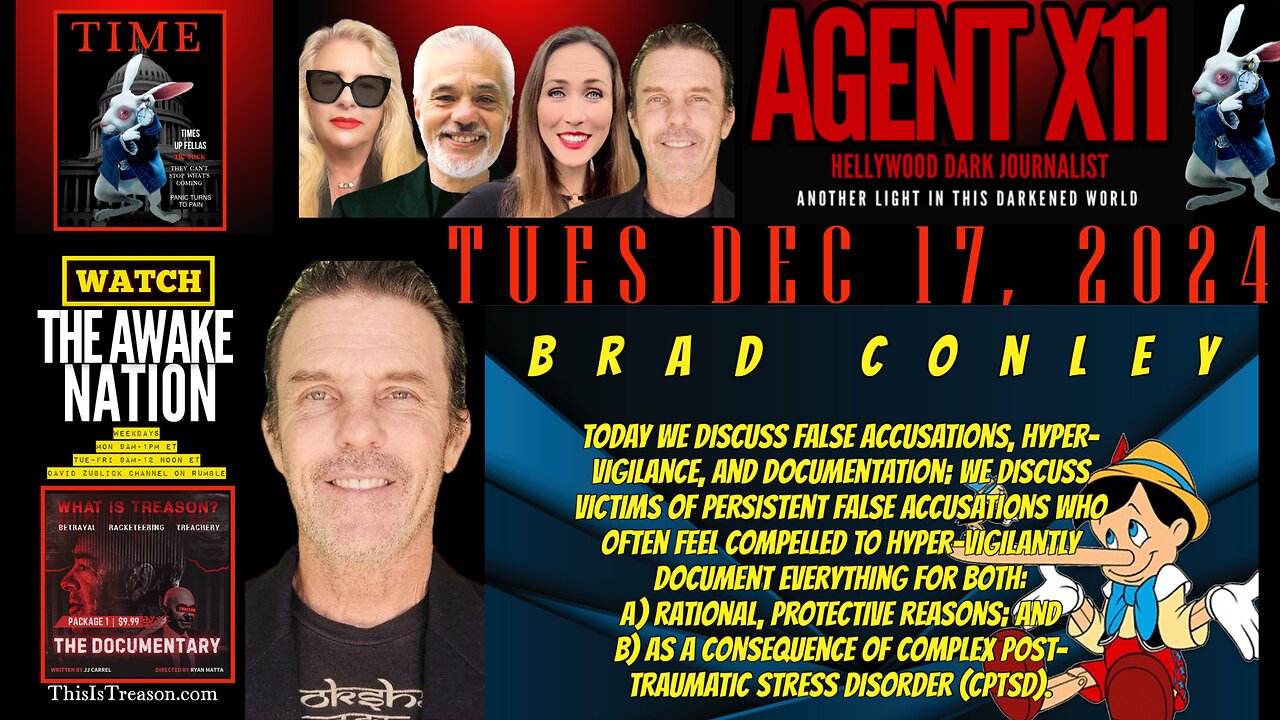Premium Only Content

AGENT X11: EP 79: BRAD CONLEY: WHISTLEBLOWER ON THE OC COURT SYSTEM AND HOLLYWOOD
Today we discuss an X post made by Brad:
False Accusations, Hyper-Vigilance, and Documentation
Victims of persistent false accusations often feel compelled to hyper-vigilantly document everything for both: A) rational, protective reasons; and B) as a consequence of Complex Post-Traumatic Stress Disorder (CPTSD). Here’s a breakdown of both perspectives:
A. Good Reasons (Practical and Protective)
1. Proof of Innocence
• False accusations threaten one’s reputation, relationships, and livelihood. Documentation becomes a defense mechanism to provide hard evidence to refute claims.
• This includes saving texts, emails, receipts, recordings, and other tangible proof to avoid being blindsided by further accusations.
2. Anticipation of Future Accusations
• Persistent false accusations create an ongoing risk of recurrence. Victims learn that being prepared for potential future claims is essential to protect themselves.
3. Avoiding Manipulation or Gaslighting
• In situations involving manipulative or dishonest accusers, the truth can be twisted. Documentation helps victims affirm their version of reality when others may question or distort it.
4. Legal Safeguarding
• Victims may face legal consequences due to false accusations (e.g., custody battles, harassment claims, criminal charges). Documenting becomes necessary for legal self-protection.
5. Rebuilding Credibility
• Hyper-documentation can help victims re-establish their reputation by presenting a clear and factual timeline of events.
B. As a Consequence of CPTSD (Emotional and Psychological Impact)
1. Hypervigilance
• CPTSD results in an exaggerated “fight or flight” response. Victims feel on constant alert for potential threats, leading to obsessive documentation as a perceived form of control or safety.
2. Fear of Being Disbelieved
• Victims often experience invalidation and disbelief from others. CPTSD heightens this fear, compelling them to document everything to “prove” they are not lying or exaggerating.
3. Loss of Trust in Reality
•Prolonged exposure to false accusations can cause victims to second-guess their own memories and experiences. Documentation becomes a way to validate their perception of events.
4. Repetition of Trauma Patterns
• Victims of repeated accusations may feel trapped in cycles of trauma where documentation serves as a coping mechanism to preemptively fight back or feel less helpless.
5. Anxiety Relief Through Control
• The act of documenting can provide temporary relief from anxiety. Victims may feel as if they are “staying ahead” of their accuser and reducing unpredictability, a common CPTSD trigger.
6. Overcompensating for Guilt or Shame
•Even though victims are innocent, CPTSD can amplify feelings of guilt and shame. Documenting everything can feel like a way to justify their innocence, even to themselves.
In summary, the impulse to hyper-document is both a logical strategy to protect oneself from harm and a psychological response rooted in the survival mechanisms of CPTSD. It reflects the victim’s attempt to regain control, safety, and credibility in the face of persistent threats to their well-being.
You can find Brad on X at Brad_Conley
-
 LIVE
LIVE
Dr Disrespect
2 hours ago🔴LIVE - DR DISRESPECT - TRIPLE THREAT CHALLENGE - EXTREME EDITION
4,517 watching -
 LIVE
LIVE
The Charlie Kirk Show
1 hour agoThe Bravest Presidential Action In Decades + Trump's Spiritual Rebirth | Sen. Mullin | 1.22.2025
13,445 watching -
 1:41:39
1:41:39
Matt Kim
14 hours agoThe Single Best Part of Trump's Inauguration | Matt Kim #137
16.1K1 -
 LIVE
LIVE
The Dana Show with Dana Loesch
1 hour agoThe Dana Show | 01-22-25
522 watching -
 58:20
58:20
The Dan Bongino Show
5 hours agoPresident Trump Did More In A Day Than Others Did In Two Terms (Ep. 2406) - 01/22/2025
649K778 -
 57:21
57:21
Russell Brand
3 hours agoBREAK BREAD EP. 11 - NATHAN FINOCHIO
102K3 -
 2:02:32
2:02:32
Steven Crowder
5 hours agoNon-Stop Winning: How Trump Axed DEI & the Unholy Sermon at the National Cathedral
423K320 -
 59:11
59:11
The Rubin Report
3 hours agoWatch the Moment Charlamagne tha God Realizes Dems Have Been Lying the Whole Time
58.5K46 -
 3:32:27
3:32:27
Right Side Broadcasting Network
1 day agoLIVE REPLAY: RSBN Post-Inauguration Coverage - 1/22/25
132K14 -
 2:04:05
2:04:05
LFA TV
18 hours ago$3 TRILLION IN 3 DAYS! | LIVE FROM AMERICA 1.22.25 11am
46.1K26